Text
SEGA and the eternal issue of “Sonic’s girlfriend”

[Translator’s note: here is the original article written by @latin-dr-robotnik, originally written on the 18th of May 2020]
Today we’re going to talk about one of the aspects SEGA is more secretive about: Sonic’s relationships.
[Translator’s note: this article was written to celebrate Seaside Hill Paradise’s 200th entry. If you’re fluent in Spanish, I highly recommend you to check it out! And if you aren’t, go follow Latin’s Tumblr blog if you haven’t already and you’re into Sonamy, analyses, gushing about music and shitposts.]
This article concludes my Sonamy trilogy, and I recommend you to read the previous two articles: “SEGA and the eternal issue of the Sonamy dynamic” and “’I love you’ – forbidden words in Sonic”. This means this is a shipping article – if you’re not interested into another essay about the love life of a blue hedgehog, I can redirect you to other articles such as “Sonic and speed: are we misunderstanding them?” and “What went wrong with Classic Sonic’s music in Sonic Forces?”.
Everybody else, welcome to today’s article!
It should be noted that this article focuses more on the semi-official and strictly official aspects, since there is really not much to say about the fandom. Nowadays the fandom has a relatively peaceful coexistence, creating art, fanfics and more, for all kind of ships; sometimes there’s an occasional fight between ships or a ship that clearly is not appropriate… but besides that, everything seems relatively calm, at least in my experience and compared to other fandoms.

Too cool for relationships...
Few things are as mentioned and yet silenced by the official SEGA media as the fateful words “girlfriend” and “Sonic” put together. In official terms, Sonic has always been this young, cool hedgehog, with a pure love for nature and never too worried about life, but with a moral code that makes him fight against injustices. During his first years, Sonic was almost impatient and a little emotionally distant, although as it was the ‘90s and things were not so clear for the young SEGA star, different interpretations would take the character through different paths - some more radical than others. As the years went by, and going through many redesigns, certain aspects of his personality would be perfected, exaggerated, or even flanderized. His position on relationships, on the other hand, would remain relatively constant over the decades, with a few particular exceptions.
The this is that Sonic, in the words of his own creator Naoto Ohshima, has always been considered “a young man with a child's heart”, which has helped to substantiate and understand why the character would remain relatively distant from his feelings, and much closer to his own interests associated with the life of adventure.

... or is he?
Despite everything I just said, they tried in many occasions, if not succeeded, to give Sonic a girlfriend, with various results.
As carefree as Sonic is, and as much as SEGA tried to clarify this point over and over again, the people behind his character have always tried to introduce one or more relationships into his life. Even Naoto Ohshima himself has made his own suggestion as to who might be a hypothetical partner for his character. The different interpretations I’ve mentioned have tweaked Sonic’s character to make it more apt to certain types of dynamics, and the cultural gap between the East and the West (which I analyzed a few years ago with the first article of this “trilogy”) also has a considerable impact on the type of relationships that would be established for Sonic from very early in his history until today.
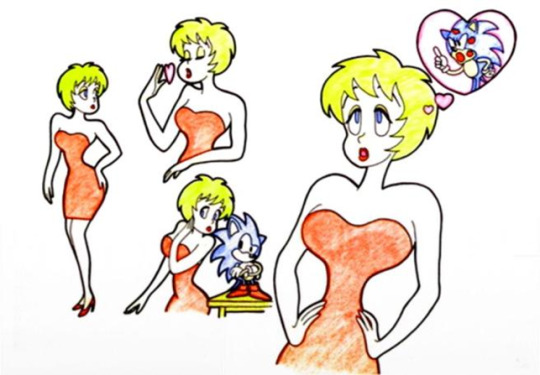
Author’s note: the concept of “Sonic + human woman” of 1990 wasn’t completely forgotten, no no, it was brought back 16 years later, in… well… the worst way possible.
Let’s see an example. Going back to his very origins, in his pre-Sonic 1 sketches Sonic was often depicted with a stereotypical damsel in distress, Madonna, his own “Princess Peach” that ended up being scrapped for many reasons, including the similarities with Super Mario. As the years have gone by, this concept has not disappeared, but rather the writers and directors of the series have taken it down different paths over time. While Madonna was too cliché, other candidates for the role of “Sonic’s girlfriend” would quickly appear to try different dynamics, directly or indirectly endorsed by SEGA.

Sally Acorn
For many years, Princess Sally was for Western fans the first person who came to mind when they thought of “Sonic’s girlfriend”. Since 1993, and for 2 more decades, her relationship with Sonic has gone in many directions, but fundamentally the most amazing thing about this whole situation was that she was Sonic’s official girlfriend (at least in the Archie Comics canon). It was also one of the many headaches for SEGA in the last decade.
Originally a fellow fighter against the macabre Robotnik from the 1993 animated series Sonic The Hedgehog, Sonic and Sally’s relationship was always marked by their opposite personalities; while Sally tends to plan ahead and is much more focused on the seriousness of the task, Sonic was the type to destroy robots first and think later. “Opposites attract,” they say, and by the (premature, I might add) end of that series both were already more than friends. They had already kissed a couple of times.

At the most critical moment in their relationship, Sonic, after a year of being missing in space and presumed dead by everyone, returns to Mobius only to end up back in potential danger, decides to ignore the wishes and warnings of Sally, who’s clearly emotionally traumatized and stressed by both the general situation and the responsibilities she had to carry out for her kingdom in the absence of her parents. The result of this explosive cocktail was one of the most infamous scenes in all of Archie Sonic, "the Slap", where Sally finally reacts violently to Sonic's selfish statements. The hedgehog's response? Well, a long exposure to the screams about her experience - also traumatic - up to that point. In the end, both end up screaming and crying in front of virtually everyone.
What followed in the next decades was an expansion of that original SatAM canon in the Archie Comics, in which its various writers introduced varying degrees of drama and increasing conflict to demonstrate the strong bond between them, destabilizing or even stabilizing it again, multiple times. They would be together for some time, then they would be apart, eventually rekindling the flame of love passionately, until a final sacrifice on their part and the eventual resetting of the entire Archie Sonic canon.
In their last years, after the Super Genesis Wave, Sonic and Sally’s relationship went back to being platonic. a good friendship with the advantages and disadvantages of their personalities - Sally’s leadership and Sonic’s extreme confidence - while the focus was put on the flourishing relationship between Sally and her best friend (and old computer!) Nicole.
Regardless of the way their relationship ended, it's undeniable that Sally has left a huge mark. Being a product of the West, her existence was never really accepted by the Sonic’s Japanese creators, but because the bulk of the fandom is here in the West, Sally's presence has been strongly associated with Sonic, the Freedom Fighters, the comics... and also the ship wars between her and the character we’re going to talk about next. Her very existence was a living contradiction to the Japanese central canon, an official girlfriend who broke all the ideas that existed for Sonic in terms of his conception of relationships and lead him through unique paths. Whether for better or worse, Sally broke the mold.

Eimi. Rosy. Amy Rose.
On the opposite side of the spectrum there’s Amy, a character that was originally conceived as the Minnie to Sonic’s Mickey, but with her own dynamic.
Despite Amy’s existence being strongly tied to Sonic’s, once again Sonic Team tried to avoid the classic cliché (in this case to copy Mickey and Minnie), opting then to establish Amy as the one interested in a relationship, while Sonic runs away from this idea. For this dynamic to keep working, Sonic’s feelings have to be kept hidden, with excuses like his “shyness”, which leads to ambiguity, or because, as said before, of his “child’s heart”.
The most interesting thing is that Amy kept her canonical status of “self-proclaimed girlfriend” since 1993, which makes her “official” and “not official” at the same time, but there are some traces left from the Sonic manga of 1992 (which in turn influenced Amy’s original design), where a prototype version of Amy (or, as it was spelled there, Emi/Eimi) played the role of Sonic’s girlfriend (or Nicki’s, to be more precise). With this detail in mind, Amy can be considered, at least in the East, the very first “Sonic’s girlfriend”, even before Sally – but her situation is much more complex.
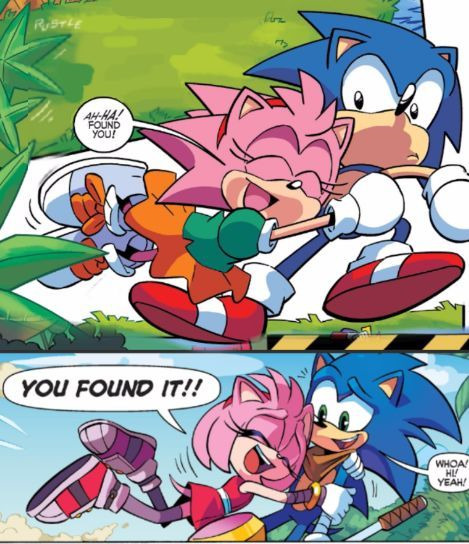
Sonic Mega Drive (top) and Sonic Boom (bottom), representing some differences in different Sonic continuities.
In any case, the manga would be the first and only time Amy was officially considered “Sonic’s girlfriend”, because in the following decades and in several continuities the core of their dynamic shifted to Amy chasing Sonic. Both would get closer or further away depending on each case (in Fleetway, for example, Amy ends up marrying another character, while in Archie Sonic there would be only a few instances of potential interest, quickly overshadowed by convenience or other things directly or indirectly related to Sally), but generally no continuity would establish an official relationship. In some cases, such as Japan, it wouldn’t even be necessary to clarify the state of the relationship, since their cultures accept more easily the dynamic that Sonic Team proposed as an “official relationship”. Just looking at the artwork highlighted on Sonic Channel (run by SEGA of Japan) shows how much more accepted the relationship is, even though Sonic Team’s official artwork still avoids any kind of public confirmation. (Author’s note: I’ve written more about Amy according to the East and the West in the first article of this trilogy)
Unlike Sally, there is no “opposites attract” situation between Amy and Sonic, and, at first, there is no prior friendship from which a potential relationship could flourish. We witnessed their dynamics from the first moment they met, and it would not be until years later that there would be a minimal basis for interaction from which various official continuities would bring both characters closer together.
Technically Amy already knew that her destiny was tied to Sonic and the events of Sonic CD on Little Planet, thanks to her tarot cards (an element that has disappeared since then), but for Sonic it was just another day of adventure, and although we’ve seen how Amy's feelings have progressed, mostly in Adventure 1 and 2, Sonic has never reflected on his personal feelings; it’s an aspect of the hedgehog that to this day remains a mystery to the audiences.

Also unlike Sally, Amy has appeared in multiple continuities of all kinds and because of that her relationship with Sonic has been affected in various ways. The main videogames canon has remained ambiguous and unchanged for 25 years: Amy would stay close to Sonic and offer some good moments to reflect on her feelings about him (some of which I mentioned in my post about Sonic Unleashed and Amy’s emotional support), while Sonic would remain distant, uncomfortable, shy, and, more recently, potentially affected by her apparent loss.
Sonic X is the first official attempt (by Sonic Team no less) to offer an expanded view of our characters. There’s a lot of discussion about how Sonic is slowly opening up to Amy’s advances, and these developments follow a line that we discussed in previous articles of this trilogy, and how, during the 2000s, the Japanese writers of the series kept slowly deepening the interactions between the two, reaching very important symbolic moments like Sonic X Ep. 9, 52 and 76, among several others. I am purposely leaving out specific details to direct your attention to this fantastic thread by Yvanix Rose that highlights some key details about how this continuity worked the Sonic-Amy dynamic. [Translator’s note: the thread is in Spanish]
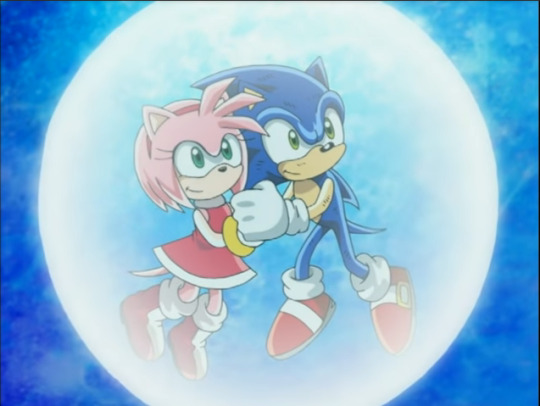
Sonic X, episode 76.
Another essential continuity for the development of this dynamic was Sonic Boom, since, despite having been a separate continuity with its own interpretation of the characters, its existence managed to influence the main canon in some way in the years that followed its original release in 2014.
Sonic Boom made two important changes in the dynamic: Amy did no longer externalize her feelings with the same frequency or intensity (speeding up a process that already started in the main canon in 2008), and Sonic was noticeably more nervous and insecure of his feelings for her, even being jealous in several occasions. These changes got the dynamic closer to the “friends who have secret feelings to each other but they’re too shy to admit it” trope, and in the second season it could even be said that there are signals of the “secretly dating” trope. Nothing was officially confirmed yet, but the changes to the dynamic offered a fresh perspective to work from: winks and inferences about a relationship that was not talked about but seemed to happen behind the scenes.
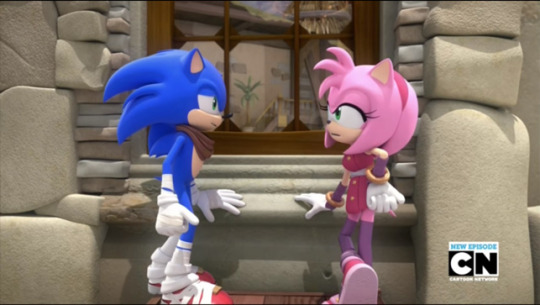
Sonic Boom S1E16.
Sonic Boom’s approach also opened the door to working a little more on the characters’ new personalities. Taking a little inspiration from the original foundations of Sally and Sonic’s relationship, Boom now presented situations where Sonic and Amy’s perspectives actively clashed with each other, leading to discussions and moments that showed a little more of the mundane details of the friendship they had, rather than appealing to more classic behaviors of the main canon, like Sonic leaving the scene in a hurry. Considering the way things turned out the last time we saw this kind of dynamic on screen, it was pretty safe to assume that their new opposites were now attracted; the implied secret dating and so on only helped to give it more sustenance - which the fandom would eventually take to the extreme.
And lastly there’s IDW Sonic, the comic series that replaced Archie Sonic after its cancellation in 2017, and the most recent arc that offers an interesting perspective. Starting its continuity from the end of the events of Sonic Forces (which at the same time took on certain characteristics from the post-Boom era, particularly as far as Amy is concerned), IDW Sonic didn’t waste any time in presenting the way in which it would carry out its dynamic between Sonic and Amy.

Amy makes her feelings for Sonic very clear, and he is surprised but unable to match them. However, Sonic doesn’t want to outright reject her, and suggests that she come with him; she refuses, claiming that she has duties to the Resistance, setting the tone for the rest of the series. (IDW Sonic #2)
“Sonic’s girlfriend” today
As I mentioned earlier, after the reboot Sally was no longer considered Sonic’s girlfriend, and her disappearance after the cancellation of Archie Sonic in general is a sign that we may not see her ever again, even as a friend. As of today, in 2020, only Amy has been left in her “unofficial, but…” state, with various minor events taking place both in the main canon and in IDW Sonic:
In 2018 the official SEGA shop wrote a description for a piece of Amy Rose merchandise that said “celebrate 25 years of Sonic’s girlfriend”; the mistake wasn’t immediately corrected, despite the fandom pointing it out immediately.
The video game canon has remained dormant, with Team Sonic Racing in 2019 featuring more of a regular friendship between Sonic and Amy, sharing rivalries and quiet moments alike.
On the other hand, since IDW Sonic and Sonic Boom laid their foundations, we've begun to see a certain shift in the way the two characters are presented. While we’ve talked about IDW Sonic already, Sonic’s social medias have done multiple “Twitter Takeovers” where Sonic characters answer questions from fans, and Sonic has always answered more like his version of Boom to the inevitable question about Amy and his “feelings”.
Recent official animations like Sonic Mania Adventures and Team Sonic Racing Overdrive have shown Amy flirting with Sonic in a more casual way.
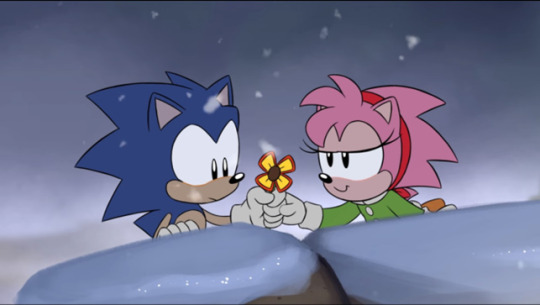
The current dynamic seems to be pointing towards “Sonic’s hidden feelings”, and I think we are at a perfect point to change the approach. SEGA in general seems more open to the idea of bringing these characters closer, probably as a marketing strategy, but without yet separating themselves from the central ideas that defined the dynamic for the last two and a half decades.
Conclusion
The idea of “Sonic’s girlfriend” has been one of the most experimental and controversial in the almost three decades that this series has been around for. SEGA has opened the door to all kinds of ambiguities, developments and interpretations, all with their pros and cons, instead of settling on a definitive position. As iconic as these characters, conceived as Sonic’s “romantic interests”, have become, they have also had their share of criticism and controversy, especially in the fandom.
The presence of Amy as the only “official but self-proclaimed girlfriend” today says a lot about the control SEGA (specifically SEGA of Japan) regained over the characters, after decades of interpretations that offered different alternatives with various degrees of success. At her best, Sally represented an ideal relationship with Sonic, much more complete and profound than the back-and-forth game between Amy and Sonic. But at her worst, this same relationship represented everything wrong that could happen by associating Sonic with the emotional spiderweb of a romantic relationship. SEGA hardening its control over the characters seems to have put an end of this type of situation where Sonic ends up being involved in a romantic telenovela, but at the same time it has revitalized the flirting game and the implicit associations that give fuel to the fandom fire.
From my humble interpretation, I think we’ve reached a point where Sonic and Amy have shared enough stories and moments to solidify the core aspects of their personalities and their friendship, allowing them to take the next step, which is to play around with the idea of “something else”. 25 years ago it was hard to see how these two characters could work together beyond “it’s SEGA’s word”; today there’s enough of a story to find a rhythm and chemistry for them, and the series of situations they've put themselves in (e.g. IDW Sonic’s plot arcs) are increasingly helping this case. The topic of “Sonic's girlfriend” may be a controversial one for SEGA and the fandom in general, but the doors have slowly been opened for this debate to develop and be investigated with interesting results, and I think that, in this new decade of 2020, there’s a unique potential to explore this kind of discussion, without sacrificing in any way the central principles of Sonic as a character. Thank you for joining me in these 200 entries, and hopefully we’ll see each other for many more.
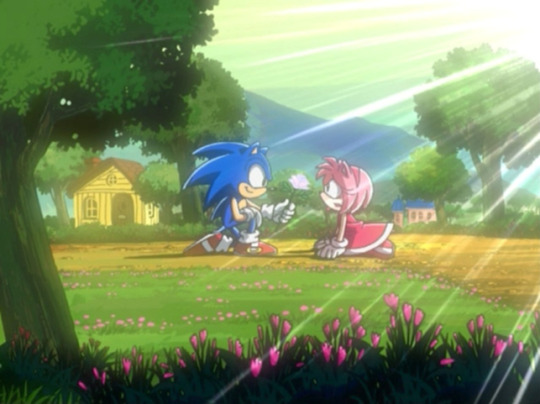
#sonic the hedgehog#amy rose#sonamy#translation#analysis#long post#happy birthday latin!#this one was so hard#i had to cut a lot of shp-related parts sadly#but this whole project was very fun and enlightening
90 notes
·
View notes